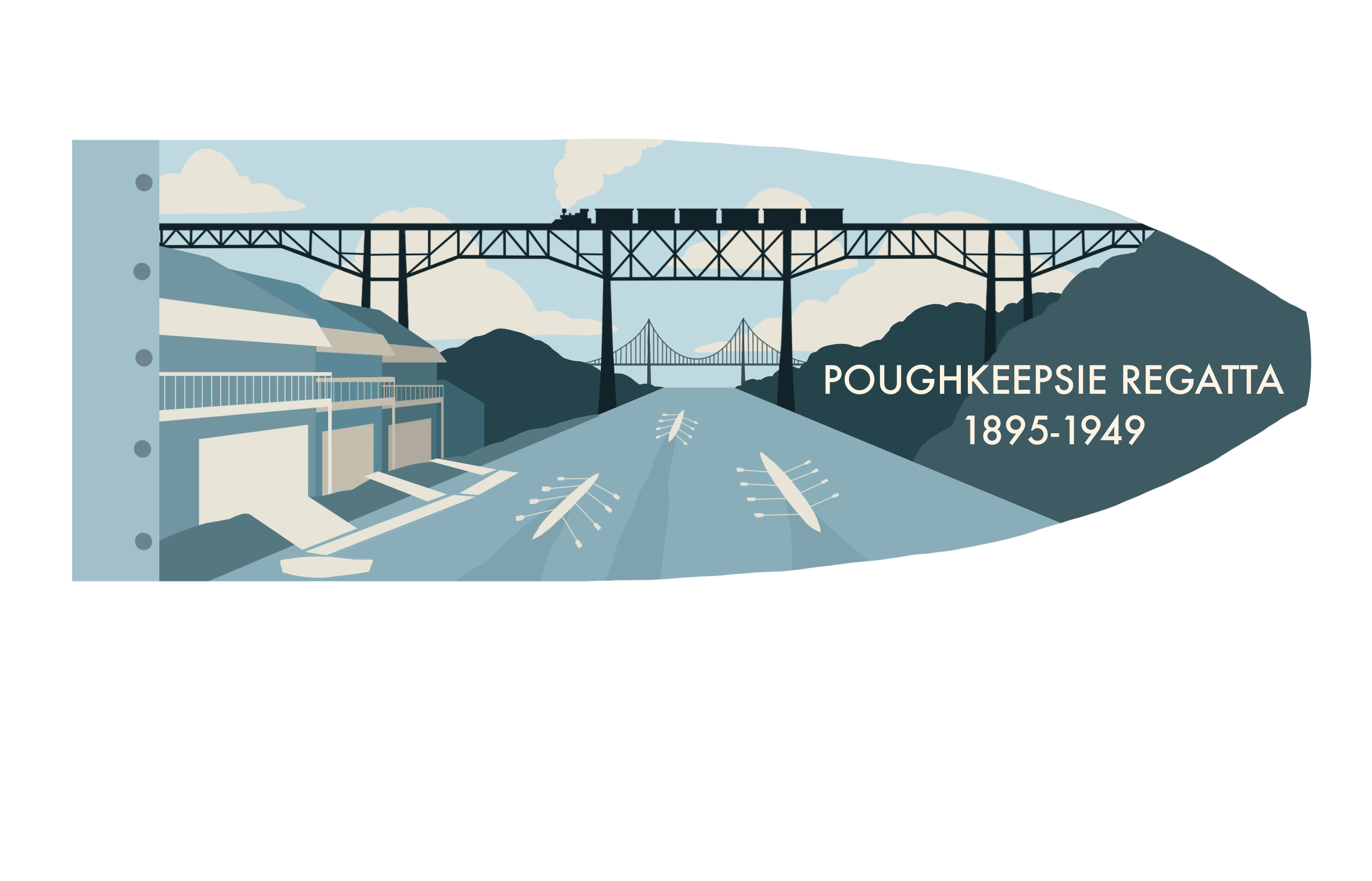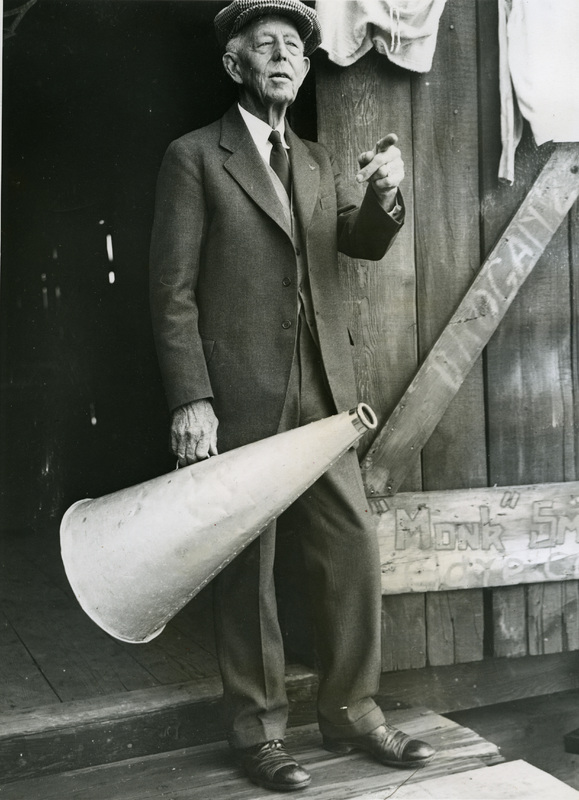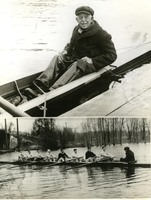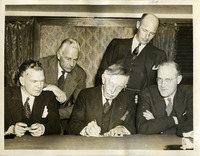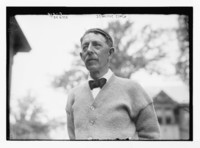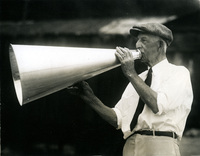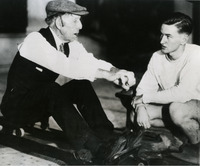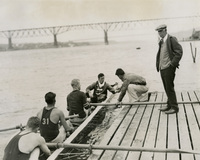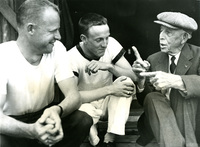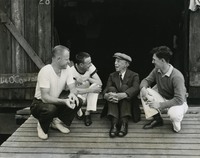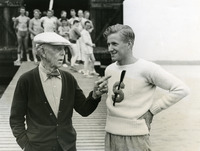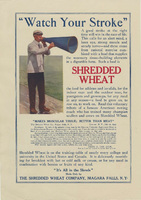James A. "Jim" Ten Eyck
Syracuse's Crew Coach 1903-1937
James A. "Jim" Ten Eyck was born into a family of boatmen. His grandfather and father were boatmen and rowers on the Hudson River. In fact, his father, James B. Ten Eyck or "Captain Jim," was an undefeated oarsman on the Hudson River until his death in 1917. Following in their footsteps, Ten Eyck helped his father on the river and early on began rowing races of his own with coaching from both his father and grandfather. At the age of 13, he won his first race and at 16 won his first single scull race at Ossining, NY.
This was the start of a professional career for Ten Eyck. He began traveling around the country to compete in races and give rowing exhibitions. By the 1870s he had made a name for himself and rowed with and against a number of professional rowers including Edward "Ned" Hanlan. In 1875, he took a break from rowing when he was appointed to the Harbor Police of New York. He worked for the police for 3 years and left as he found it too confining. He returned to rowing and in 1884, he along with 3 others won the world champtionship of rowing in England. After this he began to coach and in 1886, he coached Edward "Ned" Hanlan. He then coached several boat clubs including the Wachusett Boat Club (Worcester, MA) in 1895 (the intermediate eights that he coached set a world record at Saratoga that year) and the Worcester Boat Club. In 1897, he coached his son, Edward H. "Ned" Ten Eyck, to victory in the Diamond Sculls race at the Royal Henley Regatta.
Ten Eyck reputation as a coach began to grow and he was offered the coaching position at the Naval Academy in 1899. He continued at the Naval Academy until 1902 though the crews were only mildly successful. In 1903, he was hired to replace Edwin R. Sweetland at Syracuse University after the latter resigned. He was the second coach for the relatively new program. Ten Eyck saw moderate success at the Poughkeepsie Regatta with 2nd place in the freshman race in 1903. He followed up the next year with his varsity beating out Cornell, who had dominated the races for the last couple of years. Ten Eyck taught a different stroke than other coaches, colloquially called the "get-there stroke," as it was not as elegant as others but was very effective.
This work and new method seemed to pay off as the Syracuse crews continued to win out over more established programs, winning the freshman race in 1906 and the varsity race in 1908 (Ten Eyck's son, James E. Ten Eyck, was the stroke in both of these crews). They won the varsity race again in 1913, breaking Cornell's winning streak. Ten Eyck had built the program up to create winning crews that were capable of taking on and defeating the titans of the college rowing community. This work caught the attention of Yale University, who offered Ten Eyck the position of head coach in 1913 with a higher salary. Ten Eyck turned it down preferring to stay at Syracuse. Other than trips to coach the Duluth Boat Club in Minnesota during the summers and a few other coaching engagements, Ten Eyck remained at Syracuse until his retirement in 1937. He continued to have successes in the Poughkeepsie Regatta with varsity eight victories in 1916 and 1920 and freshman victories in 1915, 1922, 1925, 1929, and 1930.
Before Jim Ten Eyck's retirement, his son, Ned, came to Syracuse as his assistant and would take over as head crew coach in 1938. On May 28, 1937, Syracuse University named their boathouse in his honor to recognize his hard work.
He passed away at the age of 86 less than one year after his retirement on February 11, 1938 after a 3 week illness that followed a heart attack. At his funeral, the varsity crew served as pallbearers and past oarsman as honorary pallbearers. His ashes were scattered over the course of the IRA on his "beloved" Hudson River.
Known as the "Grand Old Man" or simply the "Old Man" of rowing, Ten Eyck's impact on rowing was keenly felt by his oarsmen and his peers. His rapport and support of his crew teams is evident in the many photographs in our collection. Additionally his peers regarded him highly and the Syracuse Regatta Association awards the James Ten Eyck Memorial trophy to the all points champion of the IRA. The Old Man was inducted into the Greater Syracuse Hall of Fame.
Writings by Ten Eyck:
"How I Came to Be an Oarsman." Outlook, April 23, 1924.
"Reminscences of a Professional Oarsmen." Outlook, May 21, 1924.
"The Building of a Crew." Outlook, June 4, 1924.
"Rowing and Roosevelt." Outlook, July 9, 1924.
"Rowing Distances." Outlook, May 27, 1925.
"The Choice of Time and Tide." Outlook, June 24, 1925.
"Racing Boats and Rigging." Outlook, June 23, 1926.
"Sculling as an Art." Outlook, July 6, 1927.
Sources about Ten Eyck:
Wisconsin Where They Row by Bradley Taylor
Mark of the Oarsmen: A Narrative History of Rowing at Syracuse University by Malcolm R. Alama
